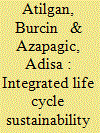| Srl | Item |
| 1 |
ID:
127997


|
|
|
|
|
| Publication |
2014.
|
| Summary/Abstract |
Commuting is one of the main contributors to the high energy consumption patterns in modern economies. The need to reduce the energy spent in commuting has attracted the attention of academics and policy makers. The main goal of this research is to improve knowledge of the economic, social, energy and environmental opportunity costs of inter-municipality commuting and to support policy-oriented strategies that explicitly take them into account. For this, we use hypothetical assumptions based on the baseline scenario that Portuguese households do not travel between municipalities for commuting purposes coupled with the expected changes in private final consumption. Accordingly, the direct, indirect and induced opportunity costs of inter-municipality commuting are assessed using an input-output model. The significance of the estimated virtual net benefits of commuting is analyzed according to their macroeconomic (GVA, taxes, international imports and employment), energy (primary energy consumption) and environmental (CO2 emissions) dimensions. The results obtained empirically indicate that inter-municipality commuting has significant opportunity costs in the GVA and GDP as well as in primary energy consumption and CO2 emissions. The results also indicate that commuters in metropolitan regions and long-distance commuters are responsible for a major share of these opportunity costs.
|
|
|
|
|
|
|
|
|
|
|
|
|
|
|
|
| 2 |
ID:
150921


|
|
|
|
|
| Summary/Abstract |
This paper presents for the first time an integrated life cycle sustainability assessment of the electricity sector in Turkey, considering environmental, economic and social aspects. Twenty life cycle sustainability indicators (11 environmental, three economic and six social) are used to evaluate the current electricity options. Geothermal power is the best option for six environmental impacts but it has the highest capital costs. Small reservoir and run-of-river power has the lowest global warming potential while large reservoir is best for the depletion of elements and fossil resources, and acidification. It also has the lowest levelised costs, worker injuries and fatalities but provides the lowest life cycle employment opportunities. Gas power has the lowest capital costs but it provides the lowest direct employment and has the highest levelised costs and ozone layer depletion. Given these trade-offs, a multi-criteria decision analysis has been carried out to identify the most sustainable options assuming different stakeholder preferences. For all the preferences considered, hydropower is the most sustainable option for Turkey, followed by geothermal and wind electricity. This work demonstrates the importance for energy policy of an integrated life cycle sustainability assessment and how tensions between different aspects can be reconciled to identify win-win solutions.
|
|
|
|
|
|
|
|
|
|
|
|
|
|
|
|